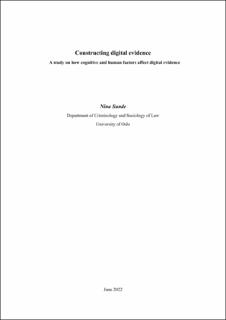| dc.description.abstract | We live in a globalized, digitized and interconnected society, where technology is woven into virtually every aspect of our social relationships and activities. Actions, movements, and communication leave digital traces, often without the actor's knowledge or effort. Such traces are also of great importance for solving crimes. It is therefore essential that digital traces are collected, examined, analysed, and presented in a way that safeguards their evidential value and minimizes erroneous and misleading results. Much research has been done on new methods, tools, processes, and frameworks for handling new technology or new ways of using technology. However, there are relatively few empirical studies of investigative practice among the police's experts in digital traces and evidence - the digital forensic (DF) practitioners. The thesis contributes to filling this knowledge gap with new insight into DF investigation practices, with the main emphasis on how the evidence is analysed and presented.
A combination of research methods is used to answer the research question:
How can a better understanding of the DF practitioners' role in constructing digital evidence within a criminal investigation enable mitigation of errors and safeguard a fair administration of justice?
The thesis is made up of five articles exploring the research question from different perspectives.
Artikkeloversikt:
Article 1: Sunde, N., Dror, I. E. (2019). Cognitive and human factors in digital forensics: Problems, challenges, and the way forward. Digital Investigation, 29, 101-108. doi: 10.1016/j.diin.2019.03.011. The article is included in the thesis. Also available at: https://doi.org/10.1016/j.diin.2019.03.011
Article 2: Sunde, N., Dror, I. E. (2021). A Hierarchy of Expert Performance (HEP) applied to digital forensics: Reliability and biasability in digital forensics decision making. Forensic Science International: Digital Investigation, 37, 301175. doi: 10.1016/j.fsidi.2021.301175. The article is included in the thesis. Also available at: https://doi.org/10.1016/j.fsidi.2021.301175
Article 3: Sunde, N. (2022). Unpacking the evidence elasticity of digital traces. Cogent Social Sciences, 8:1, DOI: 10.1080/23311886.2022.2103946. The article is included in the thesis. Also available at: https://doi.org/10.1080/23311886.2022.2103946
Article 4: Sunde, N. (2021). Strategies for safeguarding examiner objectivity and evidence reliability during digital forensic work. Forensic Science International: Digital Investigation, 40, 301317. doi: 10.1016/j.fsidi.2021.301317. The article is included in the thesis. Also available at: https://doi.org/10.1016/j.fsidi.2021.301317
Article 5: Sunde, N. (2021). What does a digital forensics opinion look like? A comparative study of digital forensics and forensic science reporting practices. Science & Justice, 61(5) 586-596. doi: 10.1016/j.scijus.2021.06.010. The article is included in the thesis. Also available at: https://doi.org/10.1016/j.scijus.2021.06.010 | en_US |
